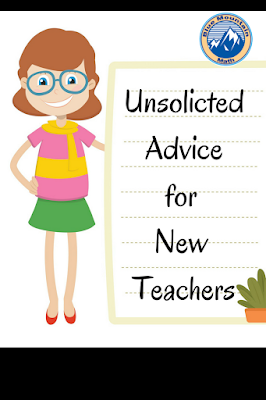All of us began as new teachers so every teacher has stories that will curl the hair of even the baldest person. And despite all the advice new teachers are given—most of it unsolicited-New teachers will have their own stories by their fifth year.
I have been a coach/support provider for the last 10 years, helping teachers who are in their first two years of teaching avoid some of the obvious pitfalls that all of us have experienced.
1) Ask More Questions You are not going to know everything, so you need to ask questions. Asking questions does not imply you are inadequate. Ask for a calendar of events. Ask about school policies and procedures. Ask if there is a support group/person for new teachers. ASK. During my first year, I did not know that teachers have mail boxes. By the 6th week, someone mentioned that they put “something” in my box but I was afraid to ask what box or where–so I scoured the office until I found it and a pile of papers long overdue. I also had to wait outside the ladies room for someone else to come out because I didn’t realize I had not been given the correct restroom key.
2) Get along with Everyone. The school secretary is your best friend, so is the janitor. The librarian may be your tech support. Every person at a school has something to contribute, and all of them have good advice. Everyone is worthy of knowing. Be nice to everyone, every day. If someone is unkind to you, smile and let it go. They are probably having a bad day; better they have a bad day than you. Don’t share your unbridled thoughts about your colleagues with anyone except your pets at home—and only the pets that do not speak. If another teacher asks you how you like Mr. Smith— don’t comment. Just smile and say “Everyone is so helpful (or kind, or generous with their materials, etc.) here.”
3) You Do Not Have All the Answers No, you really don’t. Trust me on this. I don’t care how good your school, your professor, your master teacher—you do not know everything about teaching. Even after 15 years in the classroom, I am constantly learning. New teachers have much to learn. If you tell your colleagues (or imply by your manner) than you know more than they do, they will be less likely to help you when you need it. And you will need it. Listen more in meetings and absorb information. Think before you speak.
4) Observe Colleagues I always learn so much from watching others teach—even after all these years I still notice something new and fresh that I can take back to my own classroom. Ask other teachers if you can come in and observe during your prep. Some will so no, others will be flattered. Be grateful for those that allow you access, it is a scary thing to let other observe you. You will learn something from each observation—both good and bad. And follow up that visit to another classroom with a thank you note or some chocolate.
5) The Staff Lounge is Not the Free Zone. No venting in the staff lounge. Even if others are doing it. Everyone hears everything and repeats. It is like a small town with a party line (an old reference –I never had one, but my mother said when she was growing up, people had to share phone lines and could hear each others conversations) . When I was a new teacher, I was venting at the end of the semester about how students were not passing, and didn’t work hard and I was frustrated. I really was frustrated and felt like I had failed my students but an Assistant Principal heard the conversation between the three of us and it colored his opinion of me. Years later, that person became a Principal and I was transferred to his school and he reminded me that 10 years before I had vented in a negative fashion about students and it left a bad taste in his mouth. Ok, he had a long memory—but some people do and if they are going to remember you make sure it is for something positive.
6) Be Prepared for Bad Days You are going to go home and cry some days. Teaching is hard. No one ever tells how hard it is. And people say Teachers only work 7 or 8 hours a day and then get all those holidays, breaks and summer vacations off. No one ever mentions that we spend all those days off planning lessons and grading papers. Bad days come and go My first year I can remember crying on the way home from work at least once a week. I felt like the kids hated me. The second year, I did not cry at all. The third year was the greatest, but not as great as my fifth year. Sometimes, days are still hard, but at this point I have so many really, really good days that I put them in perspective.
7) Be a Joiner. If you have a teachers union, join it. You will meet a lot of interesting people who have a lot in common with you. And you will have opportunities to grow. If the school needs help supervising an after school event (and you can do it without stressing yourself out) volunteer. You will see your students in different roles and they will see you as well. It helps build relationships. If the school needs people to serve on a committee, think about joining. The relationships you form with other staff, teachers, parents and students will follow you throughout your career.
Above all, enjoy your classroom and remember why you wanted to become a teacher. Some days it will break your heart, but it is still the greatest job in the world.











Leave a Reply